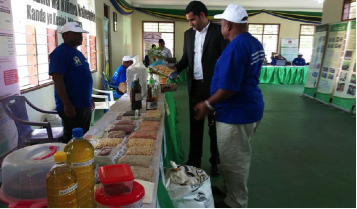ACA Begins Three New Projects Aimed at the Cashew Value Chain
Since its inception in 2006, the African Cashew Alliance (ACA) has made a great impact in the industry through multiple projects in both East and West Africa. These projects have been generously supported by donors, such as USAID, and have enabled ACA to extend its reach to all aspects of the value chain. This month, we want to highlight activities being implemented by three exciting and recently signed projects.
Walmart Foundation
With the support of the Walmart Foundation, the ACA has partnered with Self Help Africa to empower rural cashew communities in Ghana and Kenya. The project uses two low-cost community-based extension approaches: 1) ‘lead farmers’, where farmers are linked to district agricultural departments for on-going support, and 2) ‘farmer field schools’, an approach that empowers communities with skills to undertake improved agricultural practices. Overall, this project will aim to reduce poverty for 35,000 households.
By diversifying the livelihoods of farmers, through various methods such as intercropping and cashew by-products, communities will be less vulnerable to economic shocks. Farmers will also benefit from trainings on sustainable agricultural practices and the facilitation of market linkages. The project will focus specifically on women within the cashew value chain and will run from January 2015-December 2017.

USAID West Africa Trade Hub (WATH)
The USAID WATH has granted ACA the resources to strengthen the capacity of its members and own staff in order to support the entire value chain. This two-year project, titled “Capacitating Value Chain Actors to Strengthen International Competitiveness of the Cashew Industry in West Africa” is ramping up activities in the coming months. It targets a wide range of West African countries, such as Benin, Ghana, Nigeria, Côte d’Ivoire, Mali, Burkina Faso, Guinea, Guinea-Bissau, Senegal, and The Gambia.
One of the biggest obstacles that the African cashew industry faces is the absence of evidence-based decision-making. This challenge stems from two sources: the lack of quality information available in the industry and the technical abilities of cashew stakeholders processing managers to effectively handle available information. This project seeks to support the capacity of managers and stakeholders to make economically informed decisions through the provision of intensive trainings. In the two-year time frame, ACA will train 35 industry leaders and 10 internal staff members in order to strengthen technical knowledge in the industry.
Cashew is a business of small profit margins in which efficient use of resources is vital. By providing the necessary knowledge and teaching essential skills, this intervention will contribute to increased productivity and thus improve the overall competitiveness of African cashew value chain.
AfTra
The African Development Bank has granted ACA project funds under the Africa Trade Fund to strengthen the value chain in East and West Africa. The objectives of this project include 1) improving product quality and marketing development according to international best practices for poverty reduction, 2) increasing the competitiveness, income, and employment prospects for cashew processors and 3) to promote the participation of women in cashew processing.
An essential element of these activities includes the promotion of environmentally sustainable cashew processing and having an overall positive impact on the environment. This has become a significant issue for processors as cashew waste threatens overall productivity and international competitiveness. By implementing environmentally sustainable practices, ACA hopes to foster the long-term success of the industry in the global market. The project seeks to improve rural livelihoods and enhance rural living standards by generating rural employment and improved incomes.



